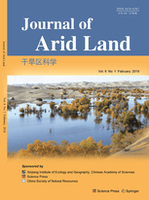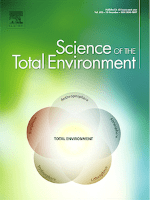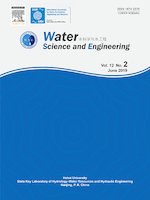
Research in Cold and Arid Regions
Scope & Guideline
Unveiling sustainable solutions for a changing climate.
Introduction
Aims and Scopes
- Hydrological Processes:
Investigating the dynamics of water movement and distribution in cold and arid regions, including studies on runoff, precipitation patterns, and their impacts on ecosystems. - Soil Mechanics and Geotechnical Engineering:
Focusing on the behavior of soils under varying conditions such as freeze-thaw cycles, salinization, and human activities, with implications for construction and land use. - Ecological and Environmental Dynamics:
Exploring the interactions between climate, soil, vegetation, and human activities, particularly how these factors influence biodiversity and ecosystem services. - Climate Change Impact Assessment:
Analyzing the effects of climate change on cold and arid regions, particularly in terms of glacier dynamics, permafrost stability, and hydrological changes. - Innovative Remediation and Management Strategies:
Developing and assessing new methods for managing environmental issues, such as soil salinization and desertification, to promote sustainable land use.
Trending and Emerging
- Climate Change Adaptation Strategies:
Increasing research on adaptive strategies to mitigate the impacts of climate change, particularly concerning water resource management, ecosystem resilience, and agricultural practices. - Permafrost and Thaw Dynamics:
A growing focus on the study of permafrost, its stability, and the consequences of thawing, which is critical for understanding climate feedback mechanisms. - Ecological Restoration and Soil Health:
Research on the restoration of degraded ecosystems and the health of soil in arid regions is gaining prominence, emphasizing sustainable practices and biodiversity. - Impact of Human Activities on Ecosystems:
There is an increasing interest in examining how human interventions, such as urbanization and land use changes, impact fragile ecosystems in cold and arid regions. - Advanced Remote Sensing and Modeling Techniques:
Emerging use of sophisticated remote sensing technologies and modeling approaches to study environmental changes and resource management in these challenging climates.
Declining or Waning
- Traditional Agricultural Practices:
Research on conventional agriculture in cold and arid regions has decreased, possibly due to a shift towards more innovative agricultural techniques and climate-resilient practices. - Historical Climate Reconstructions:
Studies focusing on historical climate data and reconstructions have become less common, as contemporary research emphasizes real-time data and immediate impacts of climate change. - Urban Development in Cold Regions:
While still relevant, the emphasis on urban development strategies specific to cold climates has waned, potentially overshadowed by broader environmental and ecological studies. - Static Geotechnical Assessments:
There is a move away from purely static assessments of soil properties, with a growing focus on dynamic and interactive models that account for climate variability. - Conventional Water Resource Management:
Traditional approaches to water resource management are less prevalent, as new methodologies focusing on integrated water management and climate adaptation strategies gain traction.
Similar Journals

Journal of Hydrology and Hydromechanics
Connecting researchers and practitioners in hydrological science.Journal of Hydrology and Hydromechanics, published by SCIENDO, is a prominent open access journal that has been disseminating crucial research findings in the fields of fluid flow, mechanical engineering, and water science since its inception in 1973. With its open access model established in 2009, the journal ensures that innovative research is available to a global audience, enhancing the visibility and impact of studies related to hydrological systems and their applications. The journal holds a commendable position within the academic community, reflected in its category quartiles, achieving Q2 rankings in 2023 across key areas such as Fluid Flow and Transfer Processes, Mechanical Engineering, and Water Science and Technology. Its Scopus rankings further highlight its relevance, placing it among the top journals in its categories. The Journal of Hydrology and Hydromechanics not only serves as a vital resource for researchers and professionals aiming to advance hydrological knowledge but also provides students with a wealth of information to better understand the complexities of water dynamics and associated engineering challenges.

Carpathian Journal of Earth and Environmental Sciences
Illuminating the Path to Sustainable Earth PracticesCarpathian Journal of Earth and Environmental Sciences is a distinguished academic journal dedicated to advancing the interdisciplinary field of Earth and environmental sciences. Published by the Carpathian Association for Environment and Earth Sciences, this journal plays a pivotal role in disseminating high-quality research focused on the dynamic interactions between geological processes and environmental changes. With an ISSN of 1842-4090 and an E-ISSN of 1844-489X, the journal is indexed in Scopus and holds an esteemed Q3 quartile ranking in both Earth and Planetary Sciences and Environmental Science categories as of 2023. Since its inception in 2008, the Carpathian Journal has provided an open access platform for researchers, professionals, and students to share insights, foster collaboration, and engage in critical discussions on pressing environmental issues. By continuously contributing to the body of knowledge in this field, the journal not only enhances academic discourse but also promotes sustainable environmental practices across Romania and beyond.

Journal of Arid Land
Bridging research and practice in water science and policy.Journal of Arid Land, published by SPRINGER HEIDELBERG, is a pivotal platform dedicated to advancing knowledge in the fields of Earth-Surface Processes, Management, Monitoring, Policy and Law, and Water Science and Technology. With an ISSN of 1674-6767 and an E-ISSN of 2194-7783, this journal stands out as a prominent source of scholarly research focusing on the unique challenges and opportunities of arid and semi-arid environments, particularly relevant in the context of global climate change. As of 2023, it holds a commendable Q2 ranking in several critical categories, underscoring its impact in environmental science and related disciplines. The journal, which has been in publication since 2009 and is set to continue through 2024, provides unrestricted access to high-quality research that sheds light on sustainable practices and effective policies. With its focus on arid lands, the Journal of Arid Land plays an essential role in fostering interdisciplinary dialogue among researchers, practitioners, and policymakers striving to address the pressing issues faced by these ecosystems.

Geosciences
Uncovering Geological Insights for a Sustainable Future.Geosciences is a prestigious open-access journal published by MDPI, dedicated to advancing research in the field of Earth and Planetary Sciences. Since its inception in 2011, this journal has fostered a collaborative environment for the dissemination of innovative ideas and findings, contributing significantly to the academic community's understanding of complex geological processes. The journal has achieved a commendable 2023 ranking in the second quartile (Q2) within its category, highlighting its impact and relevance in the field, with a Scopus rank of #41 out of 195 journals, placing it in the 79th percentile. With an aim to span a broad range of topics from environmental geology to planetary exploration, Geosciences is pivotal for researchers, professionals, and students looking for an accessible platform to share their work and stay informed of the latest developments. As a fully open-access journal, it ensures that high-quality research is freely available, fostering greater dissemination of knowledge across the globe.

Inland Waters
Elevating Understanding of Critical Freshwater IssuesInland Waters, published by TAYLOR & FRANCIS LTD, stands as a prestigious scholarly journal dedicated to the critical examination of freshwater ecosystems and their management. With an ISSN of 2044-2041 and an E-ISSN of 2044-205X, this journal boasts a remarkable Q1 ranking in both Aquatic Science and Water Science and Technology for 2023, reflecting its significant impact in the field. Researchers and professionals can benefit from its comprehensive coverage of cutting-edge research, methodological advancements, and policy implications concerning inland waters. Committed to disseminating valuable knowledge in a vital area of environmental science, Inland Waters aims to foster collaboration and promote innovative solutions for sustainable water management practices. As it continues through its converged years from 2012 to 2024, the journal remains an essential resource for those dedicated to advancing our understanding and stewardship of freshwater environments worldwide.

Science of The Total Environment
Driving Change Through Comprehensive Environmental ResearchScience of The Total Environment, an esteemed journal published by Elsevier, holds a significant position in the field of environmental science, encompassing critical areas such as Environmental Chemistry, Environmental Engineering, Pollution, and Waste Management and Disposal. With an impressive impact factor and ranked in the Q1 quartile across its categories for 2023, the journal is recognized for its high-quality research output and contribution to environmental sustainability. Operating from its base in the Netherlands, the journal has been a valuable resource since its inception in 1972, welcoming innovative studies that address complex environmental challenges. Its notable rankings—such as Rank #9 in both Environmental Sciences and Pollution—underscore its relevance and influence in the academic community. Although the journal currently does not provide an open access option, the robust findings and discussions presented within its pages continue to foster a deeper understanding of environmental issues. Science of The Total Environment is an essential platform for researchers, professionals, and students dedicated to advancing knowledge and solutions in the rapidly evolving field of environmental science.

Water Science and Engineering
Connecting Global Minds in Water Science and EngineeringWater Science and Engineering, published by ELSEVIER, is a premier open access journal that has been disseminating vital research in the realms of civil and structural engineering as well as ocean engineering since 2008. With its ISSN 1674-2370 and E-ISSN 2405-8106, this journal plays a crucial role in advancing knowledge and innovation within the sector, evidenced by its impressive rankings in Scopus—holding the 15th position out of 105 in Ocean Engineering and 76th out of 379 in Civil and Structural Engineering, placing it in the 86th and 80th percentiles, respectively. Attaining a Q1 classification in both categories for 2023 highlights its importance and influence in the academic and professional communities. The journal addresses a broad spectrum of topics integral to water sciences, offering significant insights for researchers, professionals, and students alike. With a convergence period spanning from 2010 to 2024, it continues to explore contemporary issues and advancements, providing a pivotal platform for the dissemination of research. The journal is accessible to a global audience, reaffirming its commitment to fostering open access and enhancing accessibility to vital scientific literature.

Earth Systems and Environment
Integrating Perspectives to Shape a Greener TomorrowEarth Systems and Environment, published by Springer International Publishing AG, is a leading peer-reviewed journal dedicated to the multidisciplinary study of natural and anthropogenic processes that shape the Earth's systems. With an impressive impact factor and consistently ranked in the Q1 category across various fields, including Computers in Earth Sciences, Economic Geology, and Environmental Science, it stands as a premier platform for researchers and professionals seeking to address pressing environmental challenges. The journal covers a wide spectrum of topics, from geology to global change, and emphasizes innovative methodologies and interdisciplinary approaches to understand and manage Earth systems. As an essential resource for scholars and practitioners, Earth Systems and Environment commits to excellence and facilitates open dialogue on critical issues affecting our planet.

COLD REGIONS SCIENCE AND TECHNOLOGY
Unveiling the Science Behind Cold RegionsCOLD REGIONS SCIENCE AND TECHNOLOGY is a prestigious journal published by Elsevier, widely recognized for its substantial contributions to the fields of Earth and Planetary Sciences and Geotechnical Engineering and Engineering Geology. Established in 1979 and with a converged publication cycle extending to 2024, this journal holds an impressive position within academic circles, reflected in its Q1 ranking for both categories in the latest 2023 evaluations, showcasing its relevance and influence in the scientific community. With a Scopus ranking of 23rd out of 195 in general Earth and planetary sciences and 40th out of 229 in its specialized engineering fields, the journal serves as a vital resource for researchers, professionals, and students seeking to advance their understanding of the complexities of cold region environments. Although currently not an open-access publication, COLD REGIONS SCIENCE AND TECHNOLOGY continues to be an essential platform for innovative research and interdisciplinary studies, facilitating knowledge exchange among experts addressing the challenges posed by cold climates.

Earth Interactions
Advancing Knowledge of Planetary Interactions and DynamicsEarth Interactions is a prominent journal that serves as a critical platform for interdisciplinary research in the field of Earth and Planetary Sciences. Published by the American Meteorological Society, this journal has established itself as a key resource for scholars, researchers, and professionals dedicated to understanding Earth's complex systems and their interactions. With an impressive Q1 ranking in the category of Earth and Planetary Sciences for 2023, it reflects a commitment to high-quality scholarship and impactful contributions to the field. The journal, with its dedicated coverage from 2004 to 2024, encompasses a wide array of topics, providing comprehensive insights into geological, atmospheric, and environmental phenomena. Although it operates under a non-open access model, its significance is underscored by its placement in the top percentile of Scopus rankings (Rank #89/195), making it an exciting resource for those pursuing advanced studies and applications related to Earth's systems.